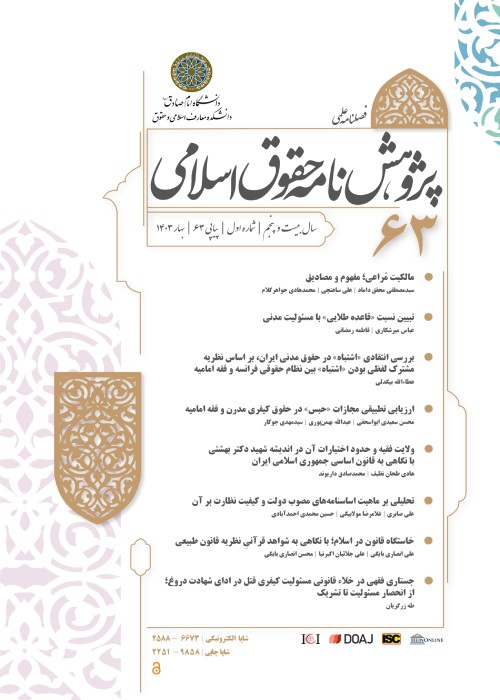The Scope of Waiving the Principle of Necessity to Remove Ambiguity from Contractual Terms
The balance of economic interests in contractual agreements is a pivotal concern across legal systems worldwide. In Islamic jurisprudence, particularly within the context of exchange conditions in sale contracts, the no-harm principle [Nafy-e Gharar] stands out as a crucial rule to maintain this balance. Despite the absence of an explicit reference in Iran's Civil Law, certain provisions reflect the principle's influence on transactional and contractual terms. This paper embarks on a comprehensive exploration of the "principle of necessity to remove ambiguity" in contractual terms, a topic that, despite previous scholarly attention, lacks a systematic and in-depth examination. The prevalent ambiguity in applying the No-harm principle across various contractual realms has led to divergent interpretations and a need for clearer guidelines. Our investigation delves into the role of ambiguity in contractual terms under Islamic jurisprudence and Iranian law, aiming to unravel the legal implications of No-harm and propose refinements to existing legislative frameworks.
Research Question:
The core inquiry of this article revolves around the legal ramifications of ambiguity in contractual terms within the realms of Islamic jurisprudence and Iranian civil law. Specifically, it seeks to understand how such ambiguity influences the creation of risk in transactions and the extent to which the "principle of necessity to remove ambiguity" is applied in mitigating these effects. This question is pivotal for clarifying the legal status of ambiguous conditions and their potential to nullify contracts deemed risk.
Research Hypothesis:
The hypothesis posits that a comprehensive application of the "principle of necessity to remove ambiguity" significantly mitigates the risk of risk in contracts by clarifying conditions that could otherwise lead to economic imbalance between parties. This clarification process is essential for ensuring the validity and enforceability of contracts, particularly in the dynamic context of modern economic and commercial transactions where speed and efficiency often prioritize over detailed negotiations of contract conditions.
Methodology & Framework, if Applicable:
This study adopts an analytical and doctrinal methodology, grounding its analysis in the primary sources of Imamia jurisprudence and the provisions of Iranian civil law. By scrutinizing the nature of risk and its implications on contractual terms, the research systematically explores the potential for ambiguity to create risk. It further examines the scope of risk creation within contractual terms, considering their secondary and dependent nature in contractual agreements. The analysis is structured around a critical examination of Iranian Civil Law Articles 232 and 233, which deal with unknown conditions within contracts. Through this lens, the study aims to elucidate how the unknown nature of a condition impacts the contract's overall unknown nature, thereby affecting its validity. The doctrinal framework provides a solid foundation for proposing legislative amendments to better address and reduce the ambiguities related to contractual terms, thereby minimizing the risk of nullity in uncertain contractions.
By investigating these dimensions, the article contributes to understanding of the legal challenges posed by ambiguous contract conditions. It seeks to offer a nuanced analysis that bridges the gap between traditional jurisprudential approaches and the practical needs of modern contractual practices, emphasizing the importance of clarity and precision in contract formation to prevent economic disparities and ensure contractual fairness. Through this exploration, the study underscores the critical role of the "Principle of Necessity to Eliminate Ambiguity" in safeguarding the integrity of contractual agreements and promoting a more stable and predictable legal environment for economic actors.
The exploration of transactional ambiguities within the framework of Islamic jurisprudence and Iranian civil law has yielded significant insights into the mechanisms through which risk (or uncertainty) is generated in contracts. A nuanced understanding of risk emerges, positioning it not as a strictly legal or religious concept but as one deeply rooted in customary practices. This customary basis underscores the importance of contextual interpretation, where not all forms of ignorance are deemed risky, but rather, significant potential harm as recognized by custom is essential for deeming an ambiguity as contributing to uncertainty.
A critical distinction is drawn between different types of conditions within a contract, highlighting the unique treatment of the "condition of quality" [Shart-e Sefat] which is inherently tied to the contract's subject matter, as opposed to other conditions that, while independent, serve a subordinate and ancillary role. This delineation is crucial for understanding the application of the Eqtefar Principle in Islamic jurisprudence and Iranian law, which permits overlooking certain ambiguities in contract conditions based on their nature and the economic insignificance attributed to them by the contracting parties.
The research meticulously details the conditions under which ambiguities in contract conditions may or may not lead to uncertainty. It is articulated that the potential for risk arises primarily from absolute ignorance in conditions that disrupt their execution, posing a dispute risk. However, the application of the Eqtefar Principle mitigates this risk, provided specific criteria are met, emphasizing the condition's ancillary nature and its alignment with the contract's main subject. This principle's application is contingent upon clear contractual content and the economic significance of the condition, which, if unclear, may elevate the condition to a status equivalent to the contract's subject, thereby increasing the risk of uncertainty.
The research culminates in understanding of the relationship between transactional ambiguities and the creation of uncertainty in contracts. It delineates the customary foundation of risk, emphasizing the need for a significant potential for harm to constitute a risk. The analysis distinguishes between conditions directly related to the contract's subject and those ancillary to it, revealing the nuanced application of the Eqtefar Principle in forgiving ambiguities in contract conditions based on their subordinate nature and economic insignificance.
A pivotal finding of this study is the conditional nature of ambiguity's impact on uncertainty, predicated on the execution feasibility of the condition and the clarity of the contractual content regarding the condition's economic significance. The research underscores that only under specific circumstances does ambiguity in conditions not affect the contract's legal status, thereby preventing risk. Conversely, when conditions are fundamental to the contract's subject or when ambiguity renders the contract's subject unknown, the risk of uncertainty is significantly heightened, potentially leading to contract nullification.
This exploration offers valuable legal insights and practical implications for drafting contracts within Islamic jurisprudence and Iranian law contexts. It highlights the importance of clarity in contract conditions and the careful consideration of conditions' roles and significances to mitigate the risk of uncertainty. The findings provide a foundation for future legal research and practice, emphasizing the need for precision and awareness of customary interpretations in contract formation and execution.
- حق عضویت دریافتی صرف حمایت از نشریات عضو و نگهداری، تکمیل و توسعه مگیران میشود.
- پرداخت حق اشتراک و دانلود مقالات اجازه بازنشر آن در سایر رسانههای چاپی و دیجیتال را به کاربر نمیدهد.



